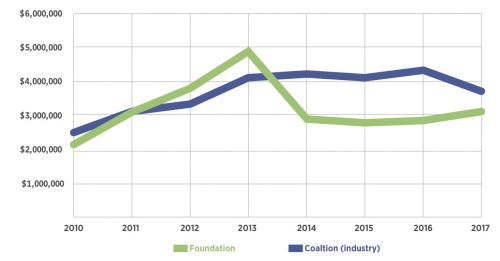Editor's note: A version of this article appeared in the November issue of Bicycle Retailer & Industry News. This version corrects an error about PeopleForBikes' dues structure and corrects that Mike Sinyard is not on the PeopleForBikes board, as we originally reported. We apologize for the errors.
BOULDER, Colo. (BRAIN) — If ever the industry's nonprofits were in the spotlight, it was in 2018.
The threat of tariffs on Chinese bike goods forced two groups, the Bicycle Product Suppliers Association and the PeopleForBikes Coalition, to get vocal.
By one count, 10 percent of public comments to the U.S. Trade Representative on the recent tariff proposal came from the bike industry, even though bike products accounted for less than 1 percent of the $200 billion tariff package. The two groups organized the campaign. (Related: Industry comments pour in regarding proposed tariffs, Aug. 9)
The achievement came at a time of reduced industry financial support for PeopleForBikes. Weak bike sales curtailed payments, and longtime supporter Specialized Bicycles said it would put its money elsewhere.
Besides the tariff threat, e-bike legislation, dockless bike share, California's Prop. 65, Oregon's bike tax, and online sales tax collection all required a unified voice from the bike world in 2018.
Despite the groups' efforts, the tariff was approved. But the bike lobby managed to get helmets and lights exempted and continues to work to get exemptions for the industry and to try to prevent the tariff from increasing to 25 percent in January.
The industry supports the PeopleForBikes Coalition, a trade association, with dues and donations that totaled $3.7 million in 2017. The PeopleForBikes Foundation receives donations and grants from outside the bike industry. Last year the Foundation brought in $3.1 million.
The Coalition's revenue from industry dues and donations fell by about $600,000 from 2016 to 2017. Dues are 0.1 percent of a company's total income from bike-related sales. "When bike industry sales are soft, the dues are soft," said Tim Blumenthal, the organization's president.
The drop from 2016 to 2017 at the Coalition was partly caused by timing — some dues arrived after New Year's and weren't counted for 2017, Blumenthal said. The rest is explained by soft sales and a shrinking Interbike show. Interbike's payment is tied to the number of booths it sells.
The 2018 revenue is not likely to look any healthier, in part because of Specialized's decision.
Specialized's founder Mike Sinyard explained in a recent BRAIN online column that his company was shifting support away from groups like PeopleForBikes and IMBA and toward the Specialized Foundation and the National Interscholastic Cycling Association. The Specialized Foundation develops programs using bike riding to treat attention deficit disorder (ADD). "This is where we feel we can help the most people," Sinyard told BRAIN.
Specialized was a founding member of PeopleForBikes. Blumenthal said he's taking the long view. "I've had a steady conversation with Mike. They are such a big company that it is a big loss for us. But I would add that we run a careful financial show here, so we immediately cut spending when we learned of this. And we are determined to get [Specialized] back."
Blumenthal said PeopleForBikes is always looking to diversify funding, but support from the industry remains critical. As the bike world changes, support has come from new and unexpected sources, such as Uber, which recently created a $10 million fund devoted to urban transportation and pledged to support PeopleForBikes. The nonprofit had already been working with Jump, the dockless share bike company Uber bought earlier this year.
Blumenthal said some have urged him to look for more support from the bike share industry, parts of which appear to be exploding with venture capital money. However, he noted, few share companies have turned a profit.
"What I'll say is that the jury is still out on a lot of these companies and how much they will support us. The checks we get from them are helpful, but they are not a replacement for the bread-and-butter support from the industry," he said.
BPSA's healthy
PeopleForBikes often works closely with a smaller organization, the Bicycle Product Suppliers Association, and some in the industry have called for the groups to consolidate. Run by industry volunteers and one staffer — executive director Ray Keener — the BPSA had revenue of less than $1 million last year. Its budget has nearly doubled in recent years mostly because it created a special e-bike project funded by e-bike suppliers. That group succeeded in passing its preferred three-class e-bike legislation in 10 states through 2018. Its goal is to pass similar legislation in an additional 19 states next year.
"BPSA has strived to maintain a healthy position during these challenging and volatile industry times," said the group's president, Adam Micklin, vice president of global sales and marketing at Felt Bicycles. "BPSA's work is mission critical to industry suppliers — and retailers — and our members clearly recognize and support the important work that we do."
The BPSA and PeopleForBikes boards continue to meet to explore a possible merger. Blumenthal supports the idea and said he was "feeling positive" about a merger happening in 2019.
Related: IMBA looks to shore up industry support.


